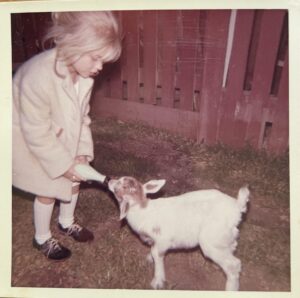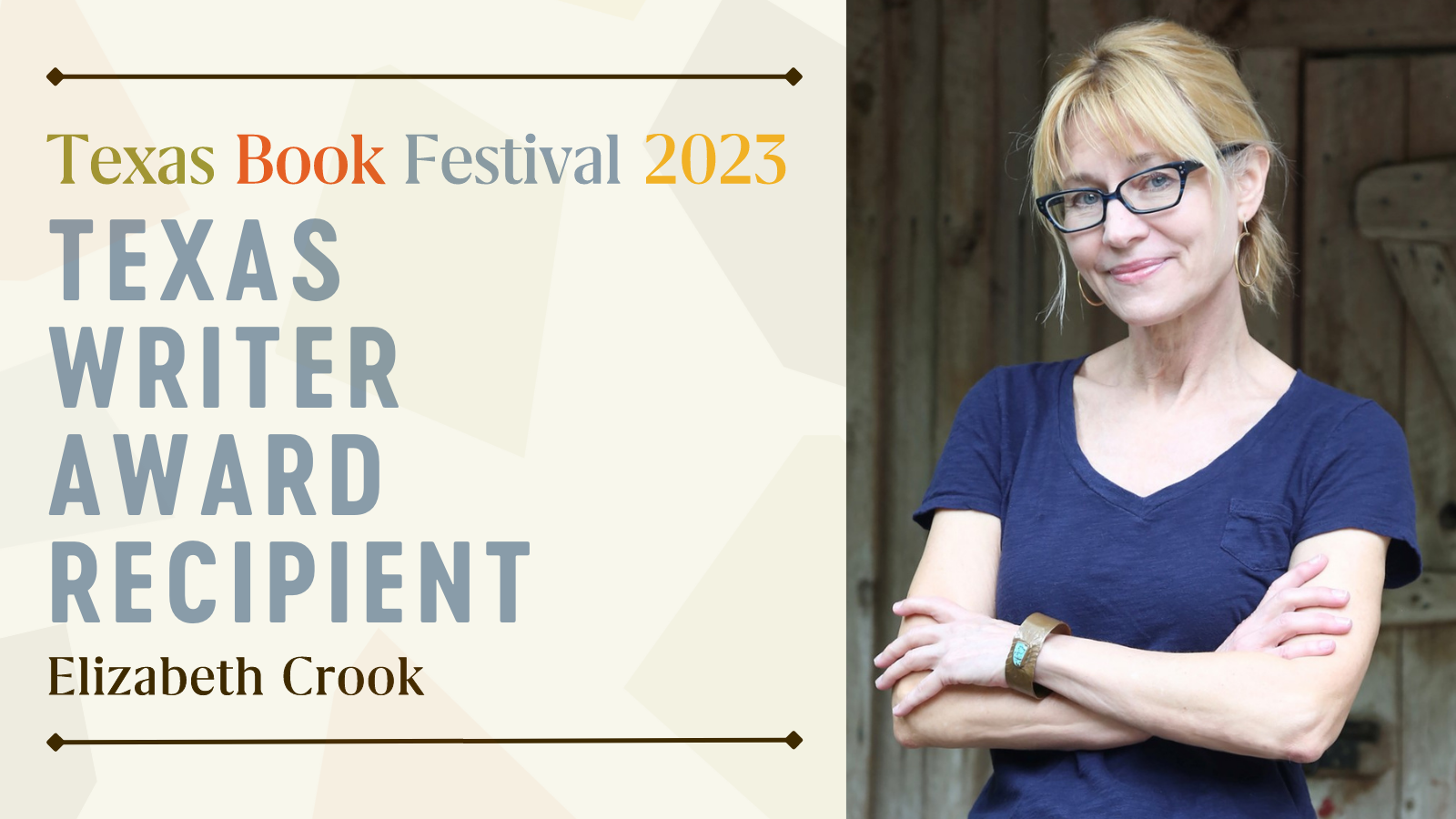Texas Book Festival is proud to announce Elizabeth Crook as the 2023 Texas Writer Award recipient.
Each year, Texas Book Festival awards the Texas Writer Award to a Texas author who has made significant contributions to the literary arts. Recipients are honored with a custom pair of handmade boots from artisanal El Paso-based bootmakers Rocketbuster during a special Festival Weekend ceremony. Previous recipients include Elizabeth McCracken, Tim O’Brien, Lawrence Wright, Stephen Harrigan, Sarah Bird, Sandra Cisneros, H.W. Brands, Greg Curtis, Steven Weinberg, and Attica Locke.
Elizabeth Crook is the author of six novels including The Which Way Tree, The Night Journal, which received the Spur Award from Western Writers of America, and Monday, Monday, winner of the Jesse H. Jones Award from the Texas Institute of Letters. Crook’s latest novel, The Madstone, will be published by Little, Brown and Company on November 7, 2023.
TBF Literary Director, Hannah Gabel, interviewed Crook about her life and work.
Can you tell us a little bit about your connection to the state of Texas? For instance, how long have you lived in the state?
I’ve lived here my entire life except for two years when I was a child, so I guess I’m pretty tightly rooted. Some of my ancestors came over from England to homestead in Zavala County generations ago, and others came later, but none of them left for good once they arrived. My great grandparents, The Holdsworths, did move to Mexico for a while, (and knew Pancho Villa!) but moved back to Texas when the Mexican Revolution became too heated. They never left after that, and I don’t assume I’ll ever be leaving either, because I have so many friends and so much family here. I can go almost anywhere in this state and feel at home.
What cities have you lived in, etc.?
Our first home was Nacogdoches, where my dad was a minister, but he resigned from the church to run for congress on a civil rights platform and lost, and we ended up in San Marcos until Lyndon Johnson appointed him director of VISTA—the domestic arm of the Peace Corps. That required a move to Arlington, near D.C., but after Nixon was elected, we came trailing back to San Marcos. I was still in grade school at that time and attended San Marcos public schools until leaving for Baylor. Later I transferred to Rice and lived in Houston for a few years, and finally moved to New Braunfels and then to Austin, where I’ve lived for the last 34 years.
Do you remember your first time at the Texas Book Festival?
Absolutely. It was in 1996, a few months after my son was born. I was still nursing him and carried him with me to all the sessions. He’s now 27.
What are some of your most salient memories from attending the Festival in years past (either as an author or attendee)?
I’ve been to nearly every festival since the beginning, either moderating panels, participating as an author, or attending sessions as a member of the audience. My best memories involve those times after I finished a panel discussion or presentation and was feeling relieved that it had gone well, with no hiccups, and I was free to sit on the sloping lawn outside the capitol and eat an entire funnel cake. I used to love lolling around on those slopes with my kids. The event I found most memorable was a presentation by my friend Steve Weinberg. I’ve been spellbound by a lot of sessions, but this one had me entranced. Steve was a Nobel laureate in physics, probably the smartest person I ever knew, and one of the kindest. He talked about politics, religion, science, education and other topics of importance, rolling more wisdom into one speech than I’ve ever heard done on any other occasion.
How, if at all, has living in Texas/Austin influenced your writing, your characters and/or your stories?
It’s difficult to have any idea who I would be, much less what I’d be writing, if I had grown up someplace other than Texas. I’m not talking about the whole Texas mystique thing, but rather about how places form a person, no matter where that place is, and my place just happened to be here. My grandparents on my mother’s side lived in Corpus Christi, so of course we spent a lot of time near the water and over on Padre Island. Running along on a beach on a cold Christmas day when the place is nearly deserted has a certain and strong impact on a child. They had a place out in the hill country, near Kerrville where they grew up, so I was around all kinds of livestock and learned to ride at an early age. Even in San Marcos we were around animals—I had a pet goat named Bilbo Baggins, my sister had a pet chicken that followed her everywhere, we had numerous dogs, cats giving birth in our closets, owls roosting in our trees. We had horses we kept in a pasture owned by an old man we loved, Mr Storts. These things make a person who they become, and to a large extent determine what a writer is drawn to write about. Texas isn’t the setting for all my books, but the influence of Texas is always there on the page.
We know your latest novel THE MADSTONE (publishing November 7th) revisits the story of Benjamin Shreve from your previous novel THE WHICH WAY TREE. At what point did you decide to continue his story?
THE MADSTONE is a stand-alone novel—a completely new story with no crossover to THE WHICH WAY TREE except that it does feature Benjamin. Frankly, I just missed Benjamin. Readers of the novel had loved him as well, so I decided to age him up and give him another adventure and allow him to fall in love for the first time. I’ve loved all of my characters over the years, even the awful, conniving ones; they’re the people I’ve had my coffee with in the mornings when I would begin writing, and often my drink in the evenings, while presiding over their lives. This creates a unique sort of affection. But those relationships somewhat end when a book is completed, and with Benjamin, I simply wasn’t ready to leave him behind.
What does receiving the Texas Writer Award mean to you?
It feels like winning an Oscar– like confirmation that all those hours of research haven’t been pointless and all those years of rethinking and second-guessing and trying always to land on the perfect word, the correct sentiment, the exact right ending, have resulted in books that are appreciated. But winning an award this prestigious is also sobering. I think of the people who boosted me along the way, and where I would be without them, and I think of the writers who are just as deserving and might have been chosen instead. I am both humbled and grateful.


